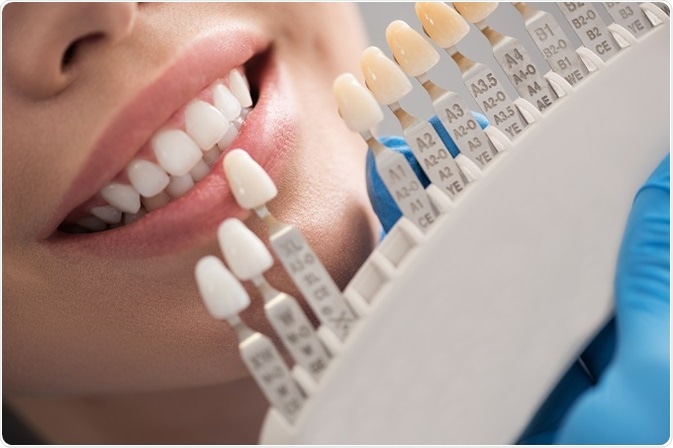Patients who have had a dental crown placed should be aware of what to expect and the best ways to care for the crown going into the future. This article will cover the most important aspects, such as the care of temporary and permanent dental crowns and recommended oral care and dental checkups.

Credit: Olena Yakobchuk/Shutterstock.com
Temporary crowns between appointments
In the standard dental crown placement procedure, there is a waiting period of approximately two weeks between the two dental appointments in order for the dental crown to be constructed to fit the bite of the individual. A temporary filling or crown is usually placed during this time, which requires particular care.
Patients should be advised to continue eating and brushing their teeth as normal; however, flossing should be avoided as this may cause the temporary filling or crown to dislodge. Patients should also be aware that it is normal to experience some sensitivity to temperature and sweet foods, and they may also notice discomfort during this time.
Appropriate use of a permanent crown
It is essential that patients realize that a prosthetic device such as a dental crown cannot match the strength and resistance of a healthy natural tooth. It should, therefore, be treated and used with care.
The crown should not be subjected to excessive pressures during the chewing process. The avoidance of very hard foods, such as the shells of nuts and hard bread, can help to prevent fractures in the crown.
Recommended oral hygiene
A dental crown that has been properly placed has a long expected lifetime of 10 to 15 years, but only if adequate maintenance practices are implemented. Therefore, it is essential for patients who have a dental crown procedure to be advised of the best methods to care for the dental crown and other teeth to increase the lifespan of the restoration.
One of the most important factors to consider for the proper maintenance of a dental crown is following good oral hygiene practices to keep the teeth clean and reduce the risk of plaque accumulation and decay in the teeth.
Every time that an individual eats, dental plaque begins to accumulate on the surface of the teeth, particularly close to the crevices of the gums. If this plaque is not removed in a timely manner, it can cause a number of negative effects such as gingivitis and gingival recession. This can be aesthetically unappealing and cause pain, particularly if an infection occurs.
In particular, it is important for patients to brush their teeth with fluoride toothpaste twice a day and floss teeth with care daily.
Do Crowns Require Special Care?
Regular dental check-ups
Even with the appropriate oral care, it is still possible for complications to affect some patients. For this reason, regular dental checkups are important to monitor the health of the dental crown and surrounding teeth so that action can be taken if necessary. Patients usually require check-up appointments twice a year, although it will depend on the specific situation.
These checkups allow a dentist to examine the crown carefully and check for any signs that there may be a problem with it or surrounding teeth. The teeth restoration can also be professionally cleaned and dental plaque or tartar can be removed.
If patients notice any discomfort of the teeth that lasts for more than a few days in between appointments, it is a good idea to schedule an appointment with the dentist to investigate the situation. In the case that the crown is chipped or falls out, it is essential that patients do not try to reattach the crown themselves and dental advice is sought immediately.
References
- https://www.tomaltydentalcare.net/
- http://www.ada.org/~/media/ADA/Publications/Files/ADA_PatientSmart_Crowns.pdf?la=en
- https://www.colgate.com/en-us
- https://www.tomaltydentalcare.net/
- http://www.infodentis.com/fixed-prosthodontics/crown-care.php
- https://madisonfamilydental.com/our-services/family-dentistry/bridges-crowns/
Further Reading
Last Updated: Mar 10, 2023